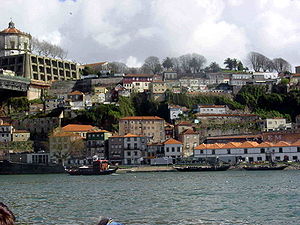Siege of Porto
| Siege of Porto | |||||||
|---|---|---|---|---|---|---|---|
| Part of the Liberal Wars | |||||||
 Serra do Pilar (left), the only Liberal stronghold south of the Douro during the Siege of Porto |
|||||||
|
|||||||
| Belligerents | |||||||
|
|
|
||||||
| Commanders and leaders | |||||||
|
Dom Pedro Duke of Terceira Marshal Saldanha |
Dom Miguel Viscount of Montalegre Viscount of Santa Marta |
||||||
| Strength | |||||||
| 12,000 | 60,000 | ||||||
| Casualties and losses | |||||||
| n/d | n/d | ||||||
The Siege of Porto is considered the period between July 1832 and August 1833 in which the troops of Dom Pedro remained besieged by the forces of Dom Miguel I of Portugal.
The resistance of the city of Porto and the troops of Dom Pedro made the victory of the liberal cause in the Kingdom of Portugal possible. Those that fought in the Siege of Porto on the Liberal side include Almeida Garrett, Alexandre Herculano and Joaquim António de Aguiar.
On 9 July 1832, the Liberal army entered Porto the day after the landing of Mindelo and found the city abandoned by the Royalist troops, whose leaders, ignoring the exact number of Liberal forces, had decided to withdraw.
General Manuel Gregório de Sousa Pereira de Sampaio, a first degree viscount of Santa Marta and supreme commander of the division that operated between the Royalists Coimbra and Vila do Conde, decided to settle in Vila Nova de Gaia. He ordered that on the same day of the entry of the Liberals forces into the city, an attack should be made against the occupants. In July 10, the Liberal English admiral George Rose Sartorius sent his boats into the mouth of the River Douro and fought back the Royalists' fire. While protected by the Liberal fleet, the division of Lieutenant-Colonel John Schwalbach crossed the river and occupied the Serra do Pilar, in Gaia, forcing the Royalists to withdraw in disorder to Oliveira de Azeméis.
Meanwhile, John Schwalbach advanced with his forces to the Alto da Bandeir and placed an advanced guard at Carvalhos. The two armies remained under mutual observation, without any of them daring to make an advance.
...
Wikipedia
